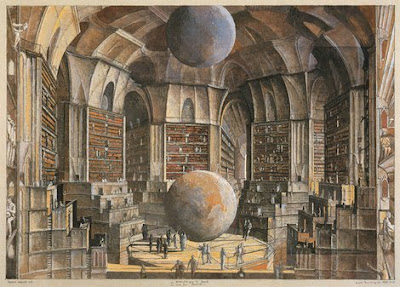 |
Érik Desmazières: La Salle des planètes. Fitch-Febvrel Gallery |
In the review written for the New York Review of Books of James Gleick's “The Information: A History, a Theory, a Flood”, Freeman Dyson comes up with a nice and elegant metaphor of Wikipedia. Dyson compares the encyclopedia to the concept of noisy channel from information theory,
Among my friends and acquaintances, everybody distrusts Wikipedia and everybody uses it. Distrust and productive use are not incompatible. […] The information that it [Wikipedia] contains is totally unreliable and surprisingly accurate. It is often unreliable because many of the authors are ignorant or careless. It is often accurate because the articles are edited and corrected by readers who are better informed than the authors.It's not exactly clear how this relates to the concept of average code length and redundancy — which is really what makes it possible to communicate over a noisy channel — but anyway it made me remember of another metaphor by Doc Searls:
[…]
It [Wikipedia] illustrates Shannon’s law of reliable communication. Shannon’s law says that accurate transmission of information is possible in a communication system with a high level of noise. Even in the noisiest system, errors can be reliably corrected and accurate information transmitted, provided that the transmission is sufficiently redundant. That is, in a nutshell, how Wikipedia works.
Wikipedia is the closest we have come, so far, to a source that is both canonical and durable, even if each entry changes constantly, and some are subject to extreme disagreement. Wikipedia is, like the protocols of the Net, a set of agreements.Both capture certain aspects of Wikipedia — reliability and accuracy Dyson, consensus and mutability Searls — that in my opinion make Wikipedia's peer-production process so interesting.
This got me thinking: are there other metaphors on Wikipedia around? Usually metaphors are useful in discourse, but in the case of Wikipedia they could also be useful in shaping what we would like to know and understand about it. Wikipedia is the classic example of a phenomenon looking for a theory that is able to explain it, and this goes under the name of the zeroeth law of Wikipedia:
The problem with Wikipedia is that it only works in practice. In theory, it can never work.Indeed the funniest — and only — example of a meta research question I know.